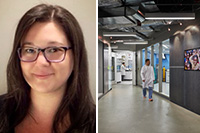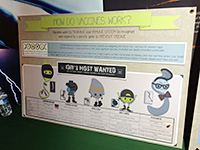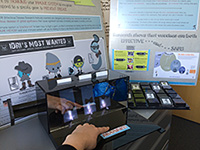

Relating the Value of Vaccines
Hitting Them with Her Best Shot: An Einstein Alum Talks to Kids about Vaccines
When she moved to Seattle, Washington two years ago, Einstein alumna Dr. Kimberly Hofmeyer relished the challenges posed by her preclinical vaccine development work at the Infectious Disease Research Institute (IDRI), a global health non-profit biotech company. She has complemented her work with community outreach at a local science museum.

Dr. Kim Hofmeyer (left) did her preclinical vaccine development work with the Immune Monitoring Center at the Infectious Disease Research Institute (IDRI), a global health non-profit biotech company.Dr. Hofmeyer recently completed a Pacific Science Center (PSC) Science Communication Fellowship, which helps scientists develop the skills to effectively engage the public and discuss their research with a non-technical audience. The program teaches how to avoid the use of jargon; for example, Dr. Hofmeyer talks about germs rather than pathogens.
The program also encourages fellows to impart new information to children by asking them questions that permit them to come up with answers on their own. "Kids often shy away from answering overly specific questions because they don't want to be wrong," she explained. "And when they come up with answers on their own, they retain the information better."
She recalled asking a group of children why they thought they get their shots. "Answers ranged from 'they keep me healthy' to 'the reason we need a flu shot each year is because the virus mutates'."
Making Learning Fun

This poster depicts characters that Dr. Hofmeyer designed to complement her interactions with children about how vaccines work.Through lessons she has devised at the PSC, Dr. Hofmeyer distills her knowledge of immunology—gained during her time as a student in the laboratory of Dr. Xingxing Zang—into a simple game to demonstrate that the immune memory generated after immunization helps your body fight and eliminate the real infection faster. In addition, to illustrate how the component of a vaccine called "antigen" is specific to a particular germ, she designed "bad guy" characters to represent five diseases, emphasizing three unique characteristics—or antigens—for each disease.
"My favorite bad guy is for the parasite that causes Chagas disease," she said. "His antigens are illustrated with a pompadour hairstyle, Ray-Bans and a bowtie."

Dr. Hofmeyer developed two games to help children understand how vaccines work. The game on the left allows them to design a vaccine by targeting particular germs or "antigens"; the other involves memory, to demonstrate how vaccines train the immune system to fight a specific germ so that it will remember that germ in the event it enters the system of a vaccinated individual.She added, "I also get to slip in information about neglected tropical diseases, which are a group of diseases that affect one billion people primarily in low-income countries and are a significant hurdle to eradicating poverty."
Clarifying Misconceptions
While vaccines save millions of lives every year throughout the world, for a vocal minority "vaccine" is considered a dirty word. Through her talks with museum visitors, Dr. Hofmeyer has found that many parents mention that their children are vaccinated, but that they are unsure how to support their decision when questioned by parents who disagree.
"The false assertion that links vaccines to autism is a frequent topic and parents want to understand the truth," she said. "I explain that it stems from an article that ultimately was retracted by the publishing journal because of data falsification, and that the author had his medical license revoked because of the fraud."
Dr. Hofmeyer plans to continue her work involving global health vaccination efforts and is eager to continue communicating with the public. "It's important that we effectively inform people about the need for and benefits of vaccines to protect the health of our growing global population. It's also imperative that we relate that information in a way that can be understood, while also sharing the science that supports their effectiveness and safety."
Posted on: Thursday, July 3, 2014

Tablet Blog